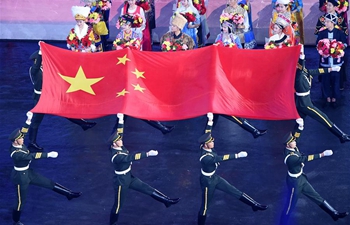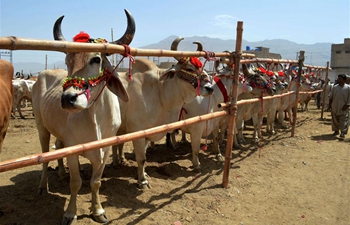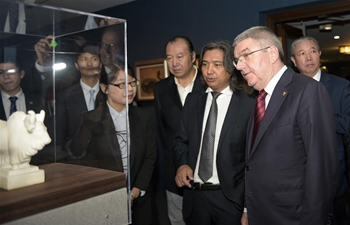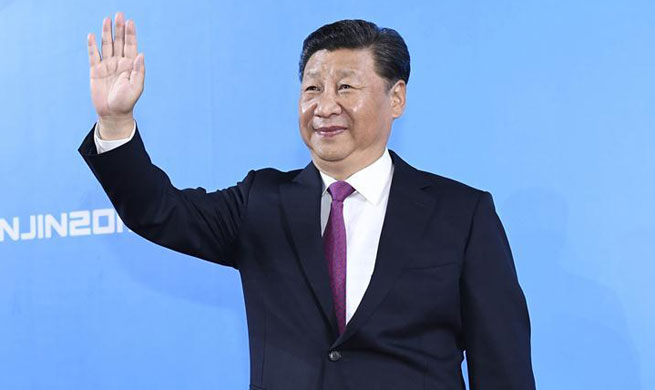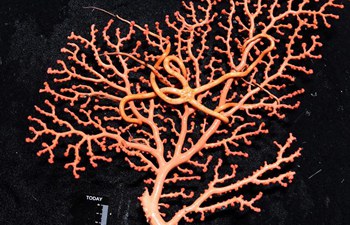YINCHUAN, Aug. 28 (Xinhua) -- Tim Harvey, an agriculture and animal husbandry expert from New Zealand, had a full schedule lined up during his visit to northwest China's Ningxia Hui Autonomous Region.
It was the 12th trip to Ningxia for Harvey, 71, who is retired as a professor from Massey University in New Zealand.
Wearing a black jacket, jeans and sneakers, Harvey climbed yellow dirt slopes, ducked under sheep pens and talked with farmers in Guyuan City, one of the poorest areas in China.
"Everywhere Harvey goes, he goes to farms first to see what questions the farmers have and organizes training around these problems," said Yang Qi, director of an animal husbandry institute in Ningxia, who accompanied Harvey on his visit.
"He has very diverse knowledge of animal husbandry and has a great deal of hands-on experience to help farmers," Yang said.
At Yanli village in Guyuan, farmer Li Shenglu did not understand why several of his lambs always had runny noses. Li received nine sheep three years ago for free from the regional human resources department, which was part of the poverty-relief aid. Now Li owns 60 sheep.
Harvey rolled up his sleeves and, together with Li, they grabbed a lamb to examine it.
"They had a bit of a cold, but nothing serious. It had not rained for days, and there is too much dust in the wind, so their noses run," he said.
This was Li's first encounter with Harvey, but many farmers in Ningxia are quite familiar with the animal husbandry expert from New Zealand.
"Every time Harvey comes, he comes to my sheep pen, despite the foul smell. He taught us how to grow clover and how to prevent diseases. I have learned a lot from him," said farmer Li Yugang, who has received training from Harvey three times.
Li owns 34 sheep. Last year, he made 40,000 yuan (about 6,000 U.S. dollars) by selling 116 of them.
Harvey has helped with animal husbandry in China for 30 years, traveling extensively in poor areas of Guizhou, Inner Mongolia, Xinjiang and Ningxia.
Harvey has received friendship awards from the Chinese government and is an honorable citizen of Guizhou for his contributions to poverty reduction there.
Accompanied by his wife, Harvey arrived in Yinchuan, capital of Ningxia, on Aug. 13. He had heart surgery in September of last year, but that has not prevented him from keeping a busy schedule.
Harvey photographed the farms and made presentations while travelling from village to village.
"Farmers see their own villages and sheep in the presentation, so they are rather interested. Harvey is very dedicated, too. He would rather stand than sit for the whole lecture," said Yang.
"Harvey is good at details and numbers. He tells farmers exactly how much they could make through certain ways of raising the cattle. This is something Chinese experts usually lack," Yang said.
"Harvey has very deep connections with farmers. He is a farmer at heart," said Ma Jikai, an official with the regional human resources department and interpreter for Harvey for 12 years.
"Ningxia has changed a lot in the last 12 years. The level of animal husbandry has especially improved," Harvey said.
"If you went back 100 years in New Zealand, you would find agriculture was based on the family, and this is similar to Ningxia. The family unit in the village is very important for agriculture in China, but we will soon see changes here as some of the big companies start to develop and use new technologies available today," he said.
If his health allows him, Harvey says he would like to go to Zambia in September.
"I enjoy helping farmers and enjoy doing this. Maybe I'm a little old and slower, but I still feel young at heart. This is something that my wife and I can do together, and we really enjoy it," he said.






